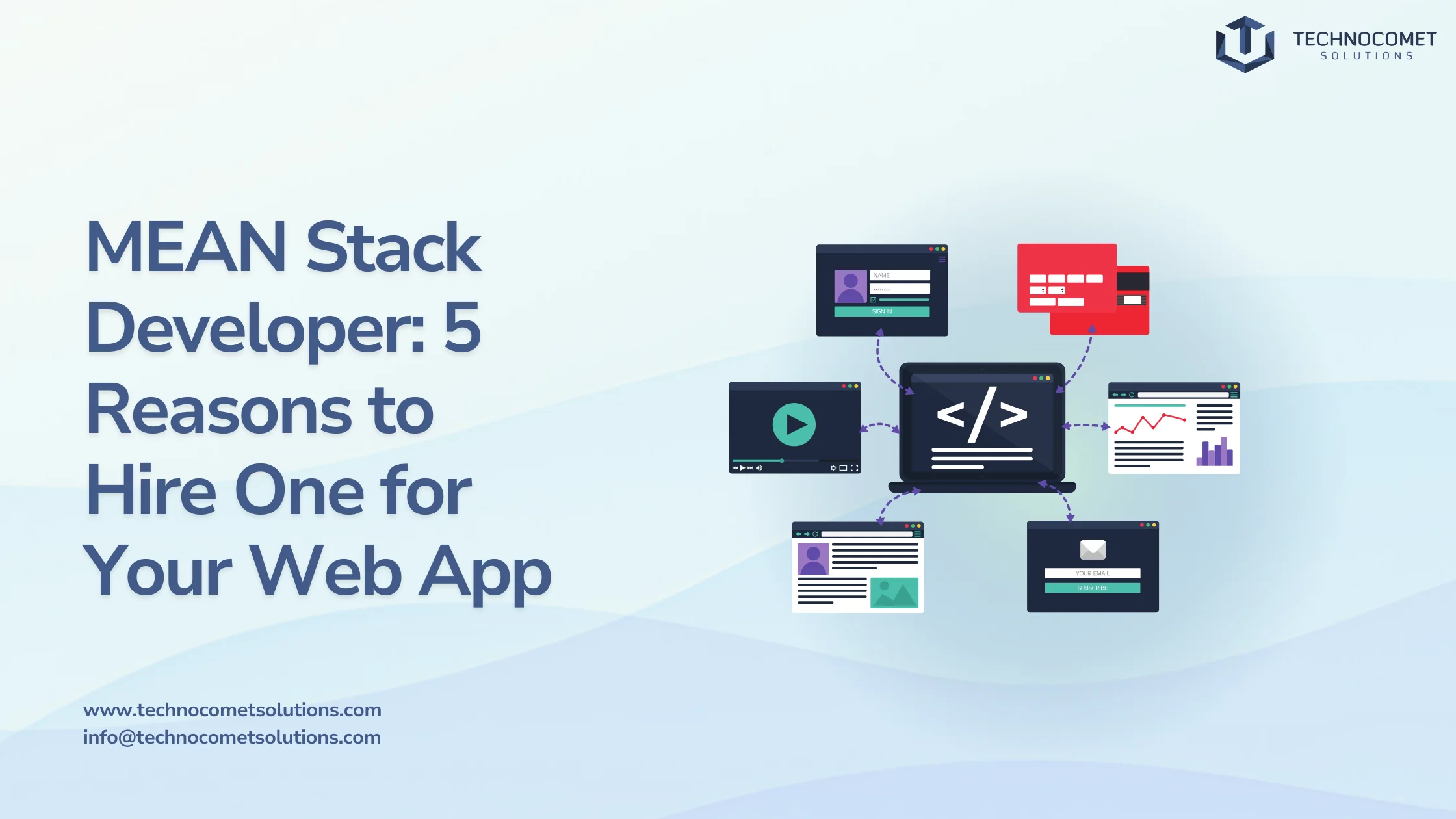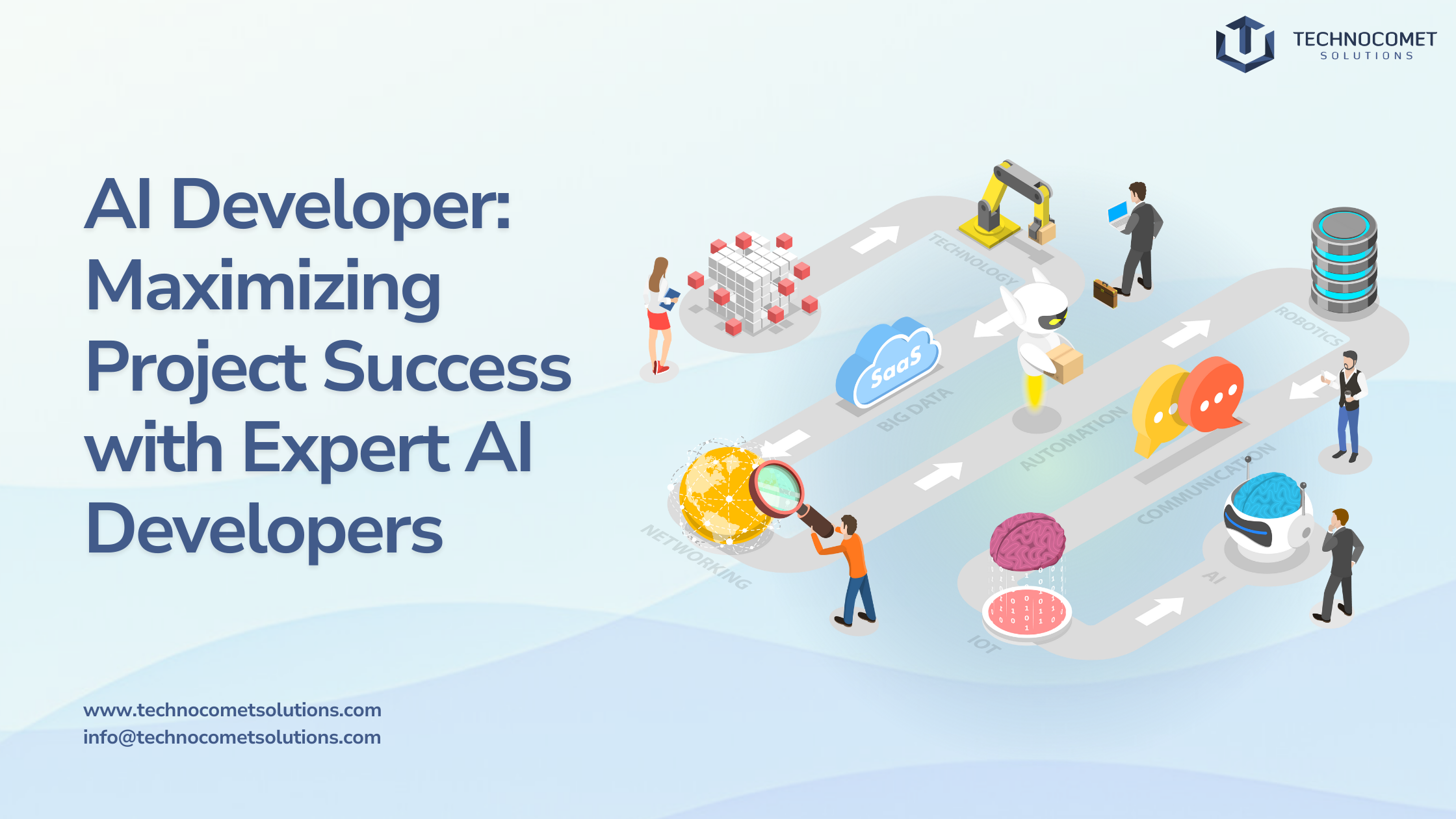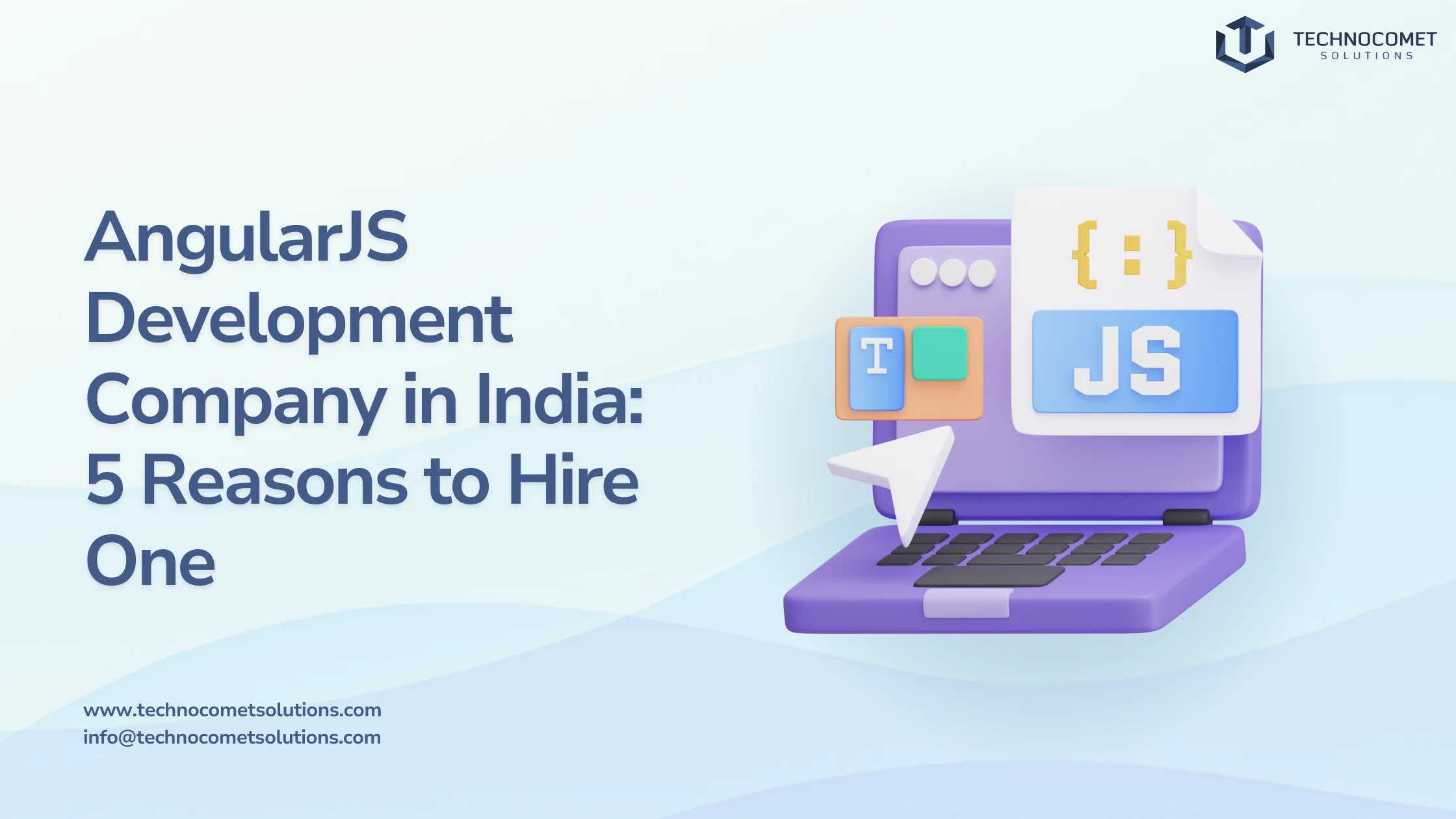Introduction
In today’s fast-paced digital landscape, the demand for high-performing web applications is rising. Businesses seek ways to enhance user experience, improve scalability, and reduce costs. One effective strategy is leveraging the MEAN stack, a powerful toolset for modern web development. Technocomet Solutions provides skilled MEAN stack developers who streamline web app development. The MEAN stack consists of MongoDB, Express.js, Angular, and Node.js. These technologies work seamlessly together, making it ideal for scalable web applications. A key advantage is its ability to use JavaScript for both frontend and backend. This simplifies development and reduces the need for multiple languages.
This full-stack JavaScript approach allows MEAN stack developers to focus on a single language. It also supports real-time updates and dynamic content, essential for modern applications. By hiring a MEAN stack developer, businesses ensure their apps use the latest technologies. This enhances their competitive edge in the market.
The Rising Demand for Dynamic and High-Performing Web Applications
Today, there is a growing demand for high-performing web applications. Businesses need enhanced user experiences, real-time updates, and seamless interactions. Unlike static websites, dynamic applications interact with users in real-time. They offer features like instant form validation, auto-suggestions, and live chat. These elements make interactions smoother, increasing user satisfaction and retention. For example, an e-commerce website can update product prices instantly. This provides a seamless shopping experience. AI in web development is also transforming how applications are built. AI-driven tools predict user behavior, automate fixes, and enhance performance. This ensures applications remain responsive and efficient.
Businesses invest in technologies that deliver fast and scalable applications. Hiring an experienced MEAN stack developer helps implement advanced features effectively. This ensures web applications stay competitive and high-performing.
Why Hiring a MEAN Stack Developer is a Preferred Choice for Modern Web Development
A MEAN stack developer is a preferred choice for modern web development due to the stack’s speed, scalability, and flexibility. The MEAN stack includes MongoDB, Express.js, Angular, and Node.js, which work seamlessly together. Using JavaScript across all layers simplifies development. Developers can focus on a single language for both frontend and backend. This reduces complexity, enhances collaboration, and speeds up development. The MEAN stack is highly scalable. MongoDB’s flexible schema and Node.js’s ability to handle high traffic make it ideal for growing applications.
It supports real-time updates, essential for modern web apps. The open-source nature of MEAN stack components also reduces costs. There are no licensing fees, and customization is easier. By hiring a MEAN stack developer, businesses ensure their web applications use the latest technologies. This leads to better performance and an improved user experience.
How Hiring a MEAN Stack Developer Streamlines Web App Development
Hiring a MEAN stack developer streamlines web app development by leveraging expertise in MongoDB, Express.js, Angular, and Node.js. These developers handle both frontend and backend tasks. This reduces the need for multiple teams and improves collaboration. The unified JavaScript approach simplifies code maintenance and updates. It allows for faster execution and lower development costs. A MEAN stack developer ensures a smooth, consistent user experience across the application. Using a single language helps them transition easily between project parts. This maintains consistency and reduces bugs. The full-stack approach also improves collaboration. Team members work with the same technologies, reducing communication barriers.
Additionally, MEAN stack developers use the stack’s modular architecture to build apps efficiently. They can write code once and reuse it across different sections. This minimizes redundant code and boosts overall efficiency.

Full-Stack Expertise for End-to-End Development
Proficiency in MongoDB, Express.js, Angular, and Node.js
A MEAN stack developer must have proficiency in all four components of the MEAN stack. This includes MongoDB for database management, Express.js for server-side scripting, Angular for frontend development, and Node.js for backend development. This comprehensive skill set allows MEAN stack developer to handle both frontend and backend tasks, reducing the need for separate teams and enhancing collaboration. By focusing on a single technology stack, MEAN stack developer can ensure that applications are consistent and well-integrated, providing a seamless user experience.
Additionally, the MEAN stack’s full-stack JavaScript approach simplifies code maintenance and updates, as changes can be made uniformly across the application. This not only speeds up the development process but also reduces the complexity of debugging and troubleshooting. MEAN stack developers can leverage this expertise to build applications that are both scalable and maintainable, ensuring that businesses can adapt quickly to changing market conditions.
Ability to Handle Both Frontend and Backend
A major benefit of hiring a MEAN stack developer is their ability to manage both frontend and backend development. This streamlines the process and ensures a smooth user experience. Using a single language allows developers to transition easily between project sections. This helps maintain consistency and reduces bugs.
The full-stack approach also enhances collaboration. Since everyone works with the same technologies, communication barriers decrease. This improves project outcomes. MEAN stack developers also optimize performance, ensuring fast load times and quick responses. This is crucial for businesses aiming to boost user engagement and conversions.
Ensuring a Smooth User Experience
The MEAN stack supports real-time updates and dynamic content, making it ideal for seamless user experiences. A MEAN stack developer uses Angular’s component-based architecture to build interactive UI components. Meanwhile, Node.js efficiently handles backend logic. This ensures a responsive and engaging experience, crucial for user retention and business success.
MongoDB’s flexible schema helps developers manage large datasets efficiently. This allows applications to scale without losing performance. By prioritizing user experience, MEAN stack developers build applications that adapt to users’ evolving needs. This enhances customer satisfaction and loyalty. In today’s competitive digital landscape, user experience is a key differentiator.
Cost-Effective and Efficient Development Process
Single-Language Development Using JavaScript
The MEAN stack’s use of JavaScript for both frontend and backend development is a major cost-saving advantage. By eliminating the need for multiple languages, a MEAN stack developer can focus on a single skill set. This reduces training costs, enhances productivity, and simplifies the development process. The single-language approach also makes code maintenance easier. Since changes can be applied uniformly across the application, updates become more streamlined and efficient.
Additionally, the MEAN stack’s modular architecture allows for better code reusability. Developers can write code once and reuse it across multiple sections of the application. This not only reduces development time but also minimizes redundant coding efforts. As a result, efficiency is significantly improved, leading to faster execution and reduced project timelines. The ability to maintain consistency in coding practices also enhances application quality.
Faster Project Execution with Reusable Code
One of the standout advantages of the MEAN stack is its modular structure, which promotes reusability. MEAN stack developers can leverage this feature to optimize development workflows. By reusing pre-built components and modules, they can significantly cut down on coding efforts. This not only speeds up the project timeline but also ensures better application consistency. With reusable code, developers maintain uniformity across different sections of the application.
Furthermore, the MEAN stack’s use of JavaScript across all development layers allows for easier integration with third-party services and APIs. This seamless integration process enables developers to quickly add new features and functionalities as needed. Since everything operates under a single language, communication between different components becomes more efficient.
Lower Development Costs
Using a single programming language throughout the MEAN stack significantly lowers overall development costs. The need for separate frontend and backend teams is minimized since one developer can manage both aspects. A MEAN stack developer can oversee the entire development lifecycle, from design to deployment. This reduces the overall staffing requirements and makes the development process more cost-effective for businesses.
Additionally, the MEAN stack consists of open-source technologies, which eliminates expensive licensing fees. Businesses can access a wide range of free development tools and community-driven enhancements. This not only reduces financial overhead but also allows for greater flexibility in customization. By leveraging the MEAN stack, businesses can create high-performance web applications without incurring unnecessary expenses.
High Scalability and Performance for Web Applications
Leveraging Node.js for Asynchronous and Real-Time Processing
Node.js plays a crucial role in the MEAN stack’s scalability and performance. Its asynchronous, event-driven architecture allows it to handle multiple requests at the same time. This makes it ideal for real-time web applications that require instant updates. A MEAN stack developer can leverage Node.js to build fast and efficient applications, such as live chat platforms, gaming apps, or collaborative tools. Additionally, Node.js can manage high traffic loads without a noticeable drop in performance. This ensures that applications remain responsive, even during peak usage times.
Another advantage is Node.js’s extensive ecosystem of libraries and modules. These tools enable MEAN stack developers to optimize performance, add new features, and enhance scalability with minimal effort. By integrating these resources, businesses can ensure their applications run smoothly under varying workloads.
MongoDB’s Flexible Schema for Handling Large Data Sets
MongoDB’s flexible schema makes it highly adaptable to changing data structures. This is a key advantage for businesses handling large and complex data sets. Unlike traditional relational databases, MongoDB does not require a fixed schema. This means MEAN stack developers can scale applications seamlessly as data requirements evolve. The ability to store unstructured data also makes MongoDB an ideal choice for applications dealing with big data and analytics. Another benefit is MongoDB’s NoSQL architecture, which ensures efficient data retrieval and storage.
This reduces the overhead commonly associated with relational databases, improving overall performance. A MEAN stack developer can design applications that process and retrieve large volumes of data quickly. This enhances user experience, particularly for applications requiring real-time analytics or dynamic content updates.
MEAN Stack’s Lightweight Architecture for High-Speed Performance
The MEAN stack’s lightweight architecture significantly contributes to high-speed performance. Node.js, combined with MongoDB, allows MEAN stack developers to create applications that load quickly and respond instantly to user actions. This ensures a seamless user experience, leading to better engagement and retention. Since the MEAN stack uses JavaScript across all development layers, it simplifies code execution. The elimination of complex compilation processes speeds up both development and application performance.
Additionally, the MEAN stack’s modular design allows developers to optimize specific application components. This targeted approach ensures that system resources are used efficiently, preventing unnecessary slowdowns. By leveraging the MEAN stack’s performance advantages, businesses can build fast, scalable, and highly interactive web applications.
Seamless Integration with Cloud and Third-Party Services
Simplified Deployment on Cloud Platforms
The MEAN stack offers seamless compatibility with cloud platforms like AWS and Google Cloud, making deployment a hassle-free process. A MEAN stack developer can efficiently set up and manage cloud environments, ensuring that applications remain highly available and scalable. This compatibility extends to cloud-based services such as data storage, analytics, and machine learning tools, which can enhance application functionality. By leveraging cloud platforms, MEAN stack developers ensure that applications can scale effortlessly to meet increasing user demands.
This helps businesses reduce the risk of downtime while maintaining optimal performance. Cloud deployment also improves cost efficiency by allowing businesses to pay only for the resources they use, making it a practical choice for startups and enterprises alike.
Easy API Integration for Adding New Features
One of the key advantages of the MEAN stack is its ability to integrate seamlessly with third-party APIs. MEAN stack developers can enhance applications with new features without requiring extensive modifications. This flexibility allows businesses to innovate and respond quickly to changing market trends while maintaining a stable application architecture. With smooth API integration, MEAN stack developers can connect applications to payment gateways, CRM systems, social media platforms, and various other services.
This not only enhances user engagement but also improves business functionality. By prioritizing API-driven development, MEAN stack developers create adaptable and feature-rich applications that cater to evolving user needs, ultimately boosting engagement and conversions.
MEAN Stack’s Compatibility with DevOps Tools
The MEAN stack is fully compatible with modern DevOps tools, enabling a smooth continuous integration/continuous deployment (CI/CD) pipeline. A MEAN stack developer can automate various aspects of development, including testing, deployment, and performance monitoring. This ensures that applications remain up-to-date, secure, and optimized for high performance. Additionally, MEAN stack developers benefit from efficient collaboration using DevOps best practices. The unified technology stack enables teams to work with a consistent set of tools, improving coordination and productivity.
By integrating DevOps methodologies, MEAN stack developers can accelerate deployment timelines, reduce downtime, and enhance overall software quality—ensuring that applications meet business goals efficiently and reliably.

Enhanced Security and Maintenance for Long-Term Stability
Built-in Security Features in Express.js and Node.js
Express.js and Node.js come equipped with built-in security features that safeguard applications against common vulnerabilities. A MEAN stack developer can leverage these capabilities to build secure applications from the ground up, minimizing risks such as data breaches and unauthorized access. For instance, Express.js provides middleware solutions for authentication and authorization, ensuring that only authorized users can access sensitive data.
Meanwhile, Node.js includes modules for encryption and secure data transmission, adding an extra layer of protection. By implementing these security features early in development, MEAN stack developers create robust applications that safeguard user data and maintain user trust.
Ongoing Updates and Community Support
The MEAN stack is backed by a large, active community of developers who continually contribute to its improvement. This means that MEAN stack developers have access to frequent updates, security patches, and best practices, ensuring that applications remain secure and up-to-date. Community support is invaluable when it comes to troubleshooting and staying ahead of emerging security threats.
Developers can rely on open-source contributions, forums, and expert insights to resolve issues quickly and effectively. This continuous support system ensures that MEAN stack applications remain stable, reliable, and well-optimized for the long term.
Efficient Debugging and Maintenance with a Unified Technology Stack
One of the biggest advantages of the MEAN stack is its unified JavaScript-based architecture, which simplifies debugging and maintenance. A MEAN stack developer can quickly identify and resolve issues across the entire application without switching between different programming languages, streamlining the debugging process. This single-technology approach not only reduces complexity but also accelerates maintenance workflows.
Updates and security patches can be applied uniformly, ensuring consistency across all components of the application. By leveraging a unified stack, businesses can maintain high-performing, easily scalable applications that meet long-term stability requirements while minimizing technical overhead.
How to Hire the Right MEAN Stack Developer for Your Project
Key Skills and Experience to Look for in a MEAN Stack Developer
When hiring a MEAN stack developer, it’s essential to prioritize expertise in MongoDB, Express.js, Angular, and Node.js. A skilled developer should have a solid grasp of full-stack development, efficiently managing both frontend and backend responsibilities. Beyond core technologies, they should be familiar with agile development methodologies and version control systems like Git.
Experience with testing frameworks and debugging tools is also vital, ensuring they can identify and resolve issues effectively. By emphasizing these key qualifications, businesses can hire a MEAN stack developer capable of delivering high-performance applications with scalability and efficiency.
Evaluating Portfolios and Past Projects for Quality Assurance
Reviewing a candidate’s portfolio and past projects is crucial in assessing their expertise in the MEAN stack. Look for applications that showcase strong integration of MongoDB, Express.js, Angular, and Node.js, ensuring they have successfully built scalable, high-performing solutions. Examine how well they have managed performance optimization, third-party API integration, and cloud services, as these aspects are critical in modern web applications.
A strong portfolio should demonstrate problem-solving skills and innovation, providing businesses with confidence in the developer’s ability to handle complex project requirements effectively.
Best Hiring Practices
Whether hiring a freelance developer or building an in-house team, it’s important to evaluate technical skills, problem-solving capabilities, and communication efficiency. Agile development experience and adaptability to emerging technologies should be considered essential traits. Conducting detailed interviews and coding tests helps verify their proficiency in the MEAN stack and ability to write clean, maintainable code.
By following these best hiring practices, businesses can ensure they recruit a MEAN stack developer who can contribute to the success of their projects while maintaining efficiency and quality.
Conclusion
The MEAN stack stands out as a powerful solution for modern web development, offering exceptional scalability, performance, and cost-efficiency. Skilled MEAN stack developers play a critical role in harnessing these advantages to create dynamic and high-performing web applications. By hiring an experienced MEAN stack developer, businesses can streamline development processes, optimize costs, and enhance user experiences. Whether launching a new application or scaling an existing one, the MEAN stack—combined with the expertise of a talented developer—ensures that web solutions remain secure, scalable, and high-performing. With the demand for MEAN stack developers continuously rising, they have become a valuable asset for businesses looking to thrive in the digital landscape. Prioritizing the right talent allows companies to execute projects efficiently, driving innovation and business growth through cutting-edge web applications.
Looking for expert IT services to enhance your web applications? At TechnoComet Solutions, we specialize in providing top-notch IT solutions, including skilled MEAN stack developer who can transform your web development projects. Contact us today!
FAQs
A MEAN stack developer is a professional skilled in MongoDB, Express.js, Angular, and Node.js. They specialize in building dynamic, scalable web applications using these technologies. MEAN stack developers are highly sought after for their ability to handle both frontend and backend tasks efficiently.
Hiring a MEAN stack developer can streamline your web app development by leveraging their expertise in full-stack JavaScript development. This reduces development costs and enhances the user experience. MEAN stack developers can also integrate third-party APIs and cloud services easily, making it simpler to add new features to applications.
A MEAN stack developer should have proficiency in MongoDB, Express.js, Angular, and Node.js. They should also be familiar with modern development practices like agile methodologies and version control systems. MEAN stack developers should be skilled in debugging and troubleshooting, ensuring that applications are stable and secure.
To find the right MEAN stack developer, evaluate their portfolio, assess their experience with the MEAN stack, and conduct thorough interviews to ensure they meet your project needs. MEAN stack developers with a strong portfolio and past projects that demonstrate scalability and performance are ideal candidates.






